Directors' Duties and Corporate Law: ASIC v Padbury Mining Case Study
VerifiedAdded on 2020/05/16
|11
|2245
|58
Case Study
AI Summary
This case study analyzes the case of ASIC v Padbury Mining Limited, focusing on the duties of company directors under the Corporations Act 2001 (Cth). The assignment examines the facts of the case, where the directors were found to have breached their duties by making misleading announcements regarding funding for a project, leading to breaches of section 180 and section 1041H of the Act. The analysis includes the court's decision, the implications for future company law in Australia, and the penalties imposed on the directors. The case highlights the importance of directors' due diligence, accurate disclosure, and the consequences of misleading conduct in the context of ASX announcements. The document explores the court's reasoning, the breaches of duty, and the broader implications for corporate governance and investor protection.
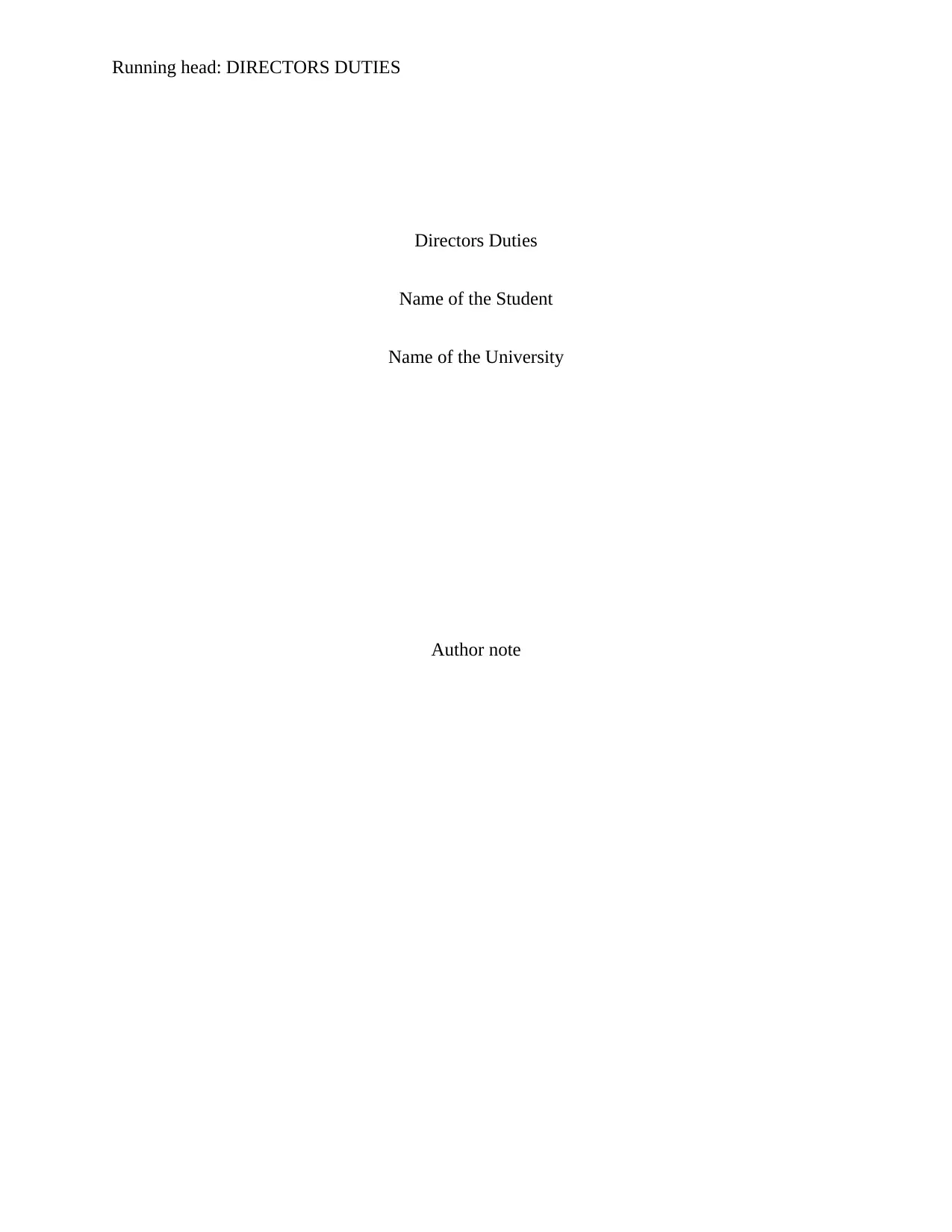
Running head: DIRECTORS DUTIES
Directors Duties
Name of the Student
Name of the University
Author note
Directors Duties
Name of the Student
Name of the University
Author note
Paraphrase This Document
Need a fresh take? Get an instant paraphrase of this document with our AI Paraphraser
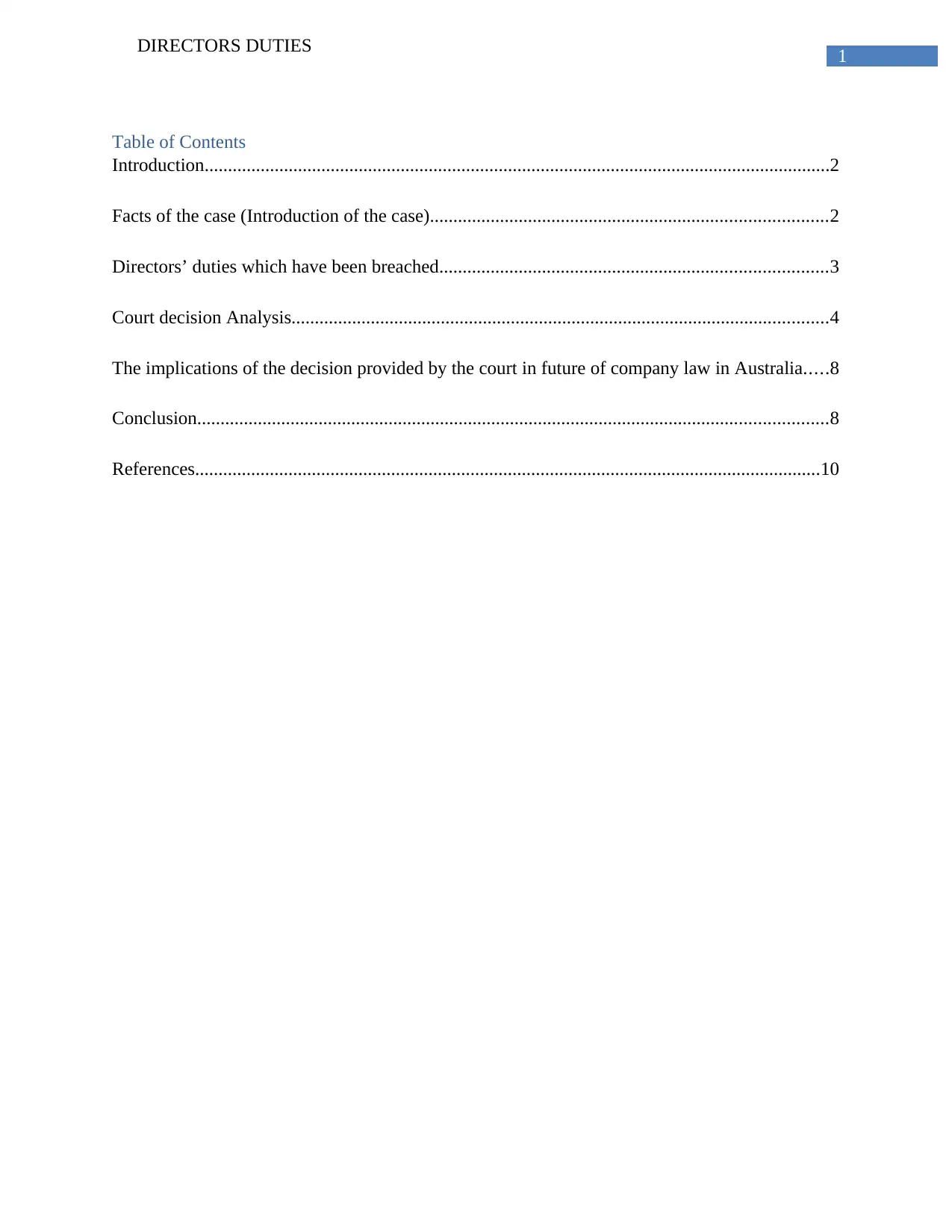
1
DIRECTORS DUTIES
Table of Contents
Introduction......................................................................................................................................2
Facts of the case (Introduction of the case).....................................................................................2
Directors’ duties which have been breached...................................................................................3
Court decision Analysis...................................................................................................................4
The implications of the decision provided by the court in future of company law in Australia.....8
Conclusion.......................................................................................................................................8
References......................................................................................................................................10
DIRECTORS DUTIES
Table of Contents
Introduction......................................................................................................................................2
Facts of the case (Introduction of the case).....................................................................................2
Directors’ duties which have been breached...................................................................................3
Court decision Analysis...................................................................................................................4
The implications of the decision provided by the court in future of company law in Australia.....8
Conclusion.......................................................................................................................................8
References......................................................................................................................................10
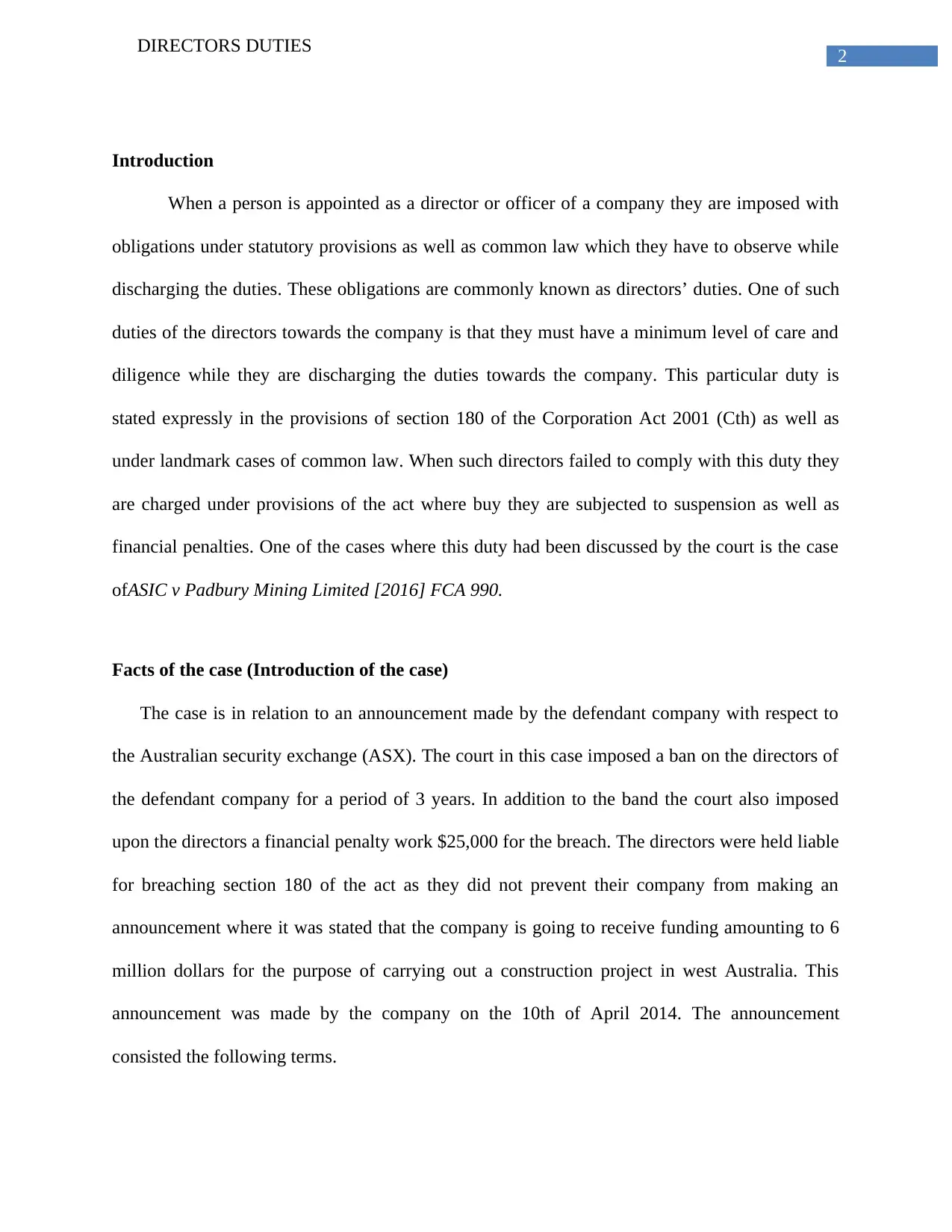
2
DIRECTORS DUTIES
Introduction
When a person is appointed as a director or officer of a company they are imposed with
obligations under statutory provisions as well as common law which they have to observe while
discharging the duties. These obligations are commonly known as directors’ duties. One of such
duties of the directors towards the company is that they must have a minimum level of care and
diligence while they are discharging the duties towards the company. This particular duty is
stated expressly in the provisions of section 180 of the Corporation Act 2001 (Cth) as well as
under landmark cases of common law. When such directors failed to comply with this duty they
are charged under provisions of the act where buy they are subjected to suspension as well as
financial penalties. One of the cases where this duty had been discussed by the court is the case
ofASIC v Padbury Mining Limited [2016] FCA 990.
Facts of the case (Introduction of the case)
The case is in relation to an announcement made by the defendant company with respect to
the Australian security exchange (ASX). The court in this case imposed a ban on the directors of
the defendant company for a period of 3 years. In addition to the band the court also imposed
upon the directors a financial penalty work $25,000 for the breach. The directors were held liable
for breaching section 180 of the act as they did not prevent their company from making an
announcement where it was stated that the company is going to receive funding amounting to 6
million dollars for the purpose of carrying out a construction project in west Australia. This
announcement was made by the company on the 10th of April 2014. The announcement
consisted the following terms.
DIRECTORS DUTIES
Introduction
When a person is appointed as a director or officer of a company they are imposed with
obligations under statutory provisions as well as common law which they have to observe while
discharging the duties. These obligations are commonly known as directors’ duties. One of such
duties of the directors towards the company is that they must have a minimum level of care and
diligence while they are discharging the duties towards the company. This particular duty is
stated expressly in the provisions of section 180 of the Corporation Act 2001 (Cth) as well as
under landmark cases of common law. When such directors failed to comply with this duty they
are charged under provisions of the act where buy they are subjected to suspension as well as
financial penalties. One of the cases where this duty had been discussed by the court is the case
ofASIC v Padbury Mining Limited [2016] FCA 990.
Facts of the case (Introduction of the case)
The case is in relation to an announcement made by the defendant company with respect to
the Australian security exchange (ASX). The court in this case imposed a ban on the directors of
the defendant company for a period of 3 years. In addition to the band the court also imposed
upon the directors a financial penalty work $25,000 for the breach. The directors were held liable
for breaching section 180 of the act as they did not prevent their company from making an
announcement where it was stated that the company is going to receive funding amounting to 6
million dollars for the purpose of carrying out a construction project in west Australia. This
announcement was made by the company on the 10th of April 2014. The announcement
consisted the following terms.
⊘ This is a preview!⊘
Do you want full access?
Subscribe today to unlock all pages.

Trusted by 1+ million students worldwide
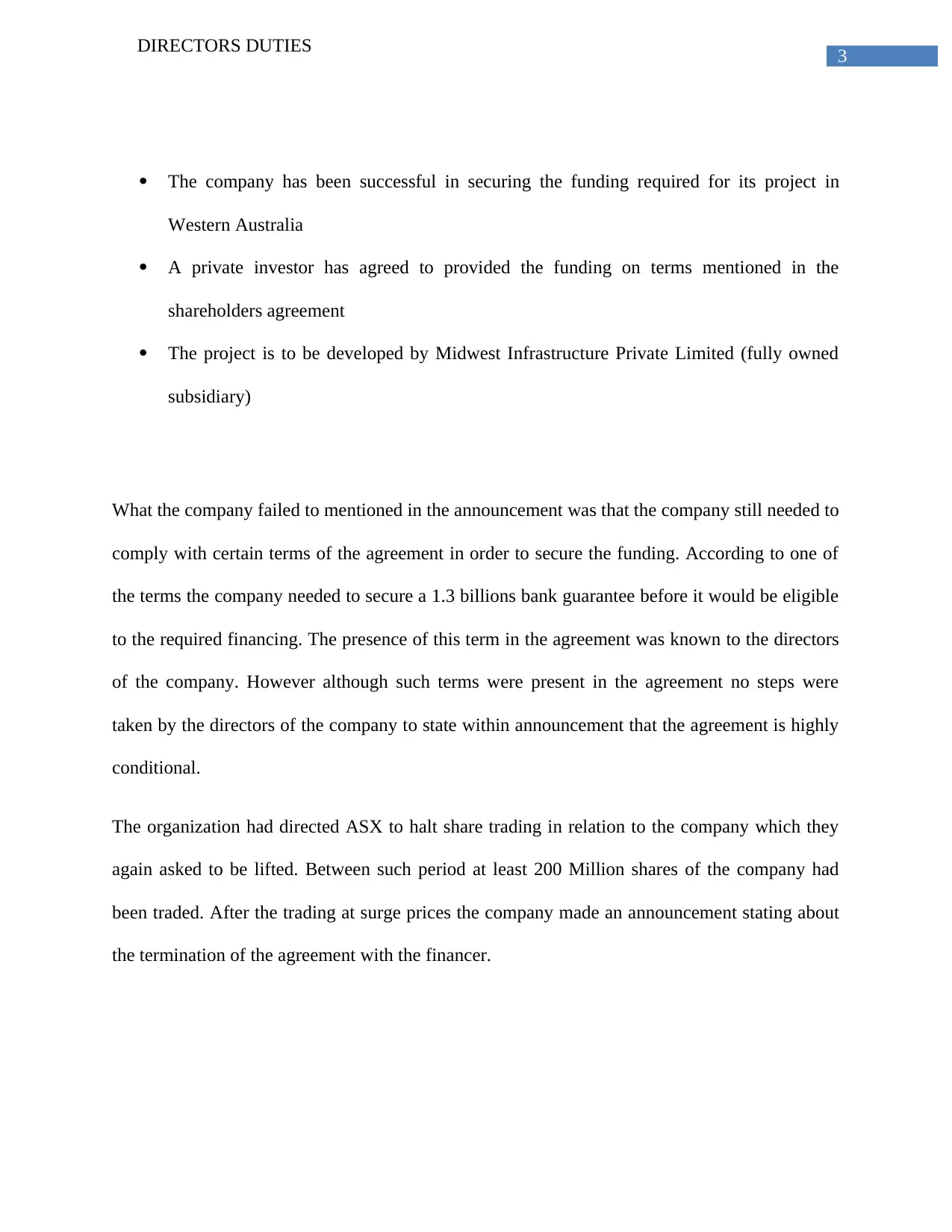
3
DIRECTORS DUTIES
The company has been successful in securing the funding required for its project in
Western Australia
A private investor has agreed to provided the funding on terms mentioned in the
shareholders agreement
The project is to be developed by Midwest Infrastructure Private Limited (fully owned
subsidiary)
What the company failed to mentioned in the announcement was that the company still needed to
comply with certain terms of the agreement in order to secure the funding. According to one of
the terms the company needed to secure a 1.3 billions bank guarantee before it would be eligible
to the required financing. The presence of this term in the agreement was known to the directors
of the company. However although such terms were present in the agreement no steps were
taken by the directors of the company to state within announcement that the agreement is highly
conditional.
The organization had directed ASX to halt share trading in relation to the company which they
again asked to be lifted. Between such period at least 200 Million shares of the company had
been traded. After the trading at surge prices the company made an announcement stating about
the termination of the agreement with the financer.
DIRECTORS DUTIES
The company has been successful in securing the funding required for its project in
Western Australia
A private investor has agreed to provided the funding on terms mentioned in the
shareholders agreement
The project is to be developed by Midwest Infrastructure Private Limited (fully owned
subsidiary)
What the company failed to mentioned in the announcement was that the company still needed to
comply with certain terms of the agreement in order to secure the funding. According to one of
the terms the company needed to secure a 1.3 billions bank guarantee before it would be eligible
to the required financing. The presence of this term in the agreement was known to the directors
of the company. However although such terms were present in the agreement no steps were
taken by the directors of the company to state within announcement that the agreement is highly
conditional.
The organization had directed ASX to halt share trading in relation to the company which they
again asked to be lifted. Between such period at least 200 Million shares of the company had
been traded. After the trading at surge prices the company made an announcement stating about
the termination of the agreement with the financer.
Paraphrase This Document
Need a fresh take? Get an instant paraphrase of this document with our AI Paraphraser
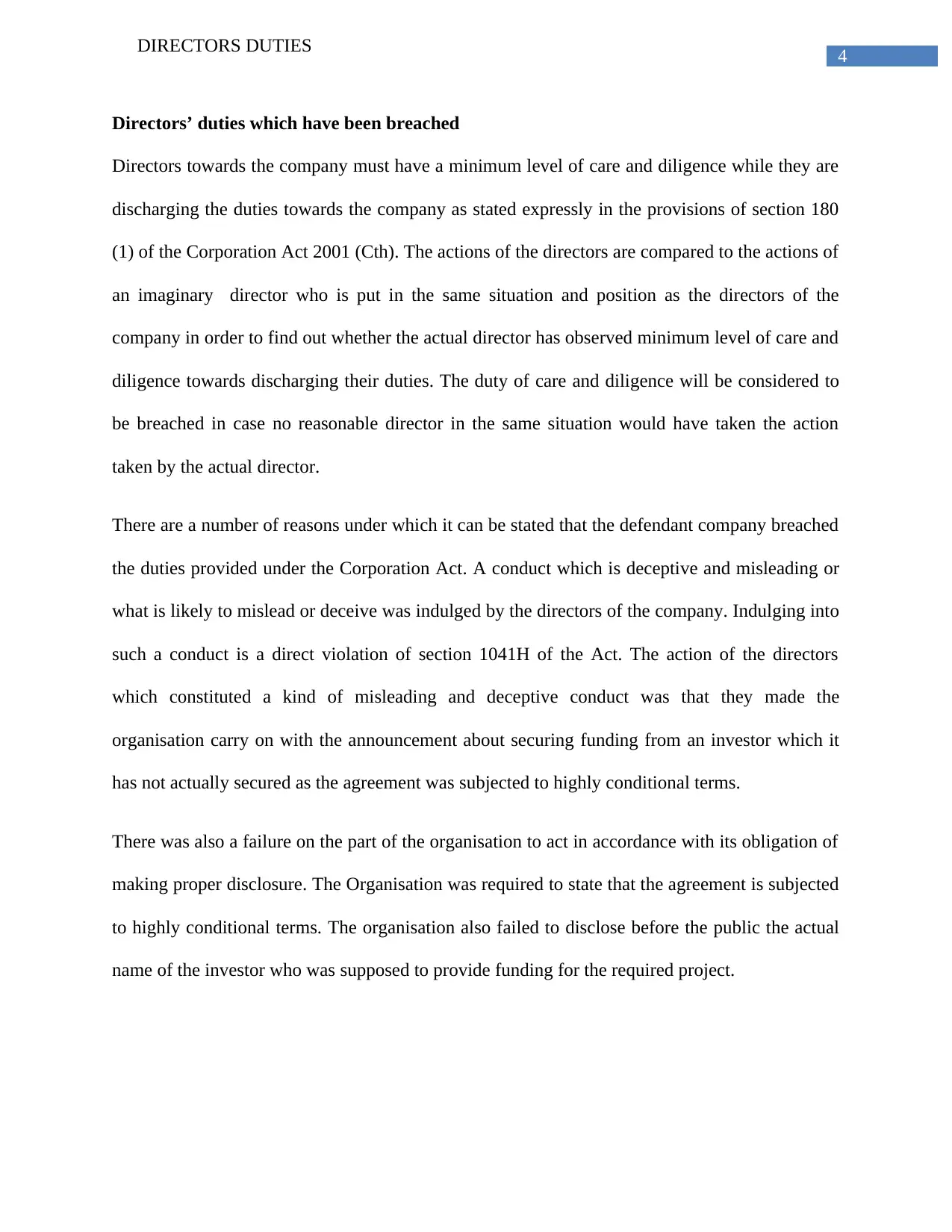
4
DIRECTORS DUTIES
Directors’ duties which have been breached
Directors towards the company must have a minimum level of care and diligence while they are
discharging the duties towards the company as stated expressly in the provisions of section 180
(1) of the Corporation Act 2001 (Cth). The actions of the directors are compared to the actions of
an imaginary director who is put in the same situation and position as the directors of the
company in order to find out whether the actual director has observed minimum level of care and
diligence towards discharging their duties. The duty of care and diligence will be considered to
be breached in case no reasonable director in the same situation would have taken the action
taken by the actual director.
There are a number of reasons under which it can be stated that the defendant company breached
the duties provided under the Corporation Act. A conduct which is deceptive and misleading or
what is likely to mislead or deceive was indulged by the directors of the company. Indulging into
such a conduct is a direct violation of section 1041H of the Act. The action of the directors
which constituted a kind of misleading and deceptive conduct was that they made the
organisation carry on with the announcement about securing funding from an investor which it
has not actually secured as the agreement was subjected to highly conditional terms.
There was also a failure on the part of the organisation to act in accordance with its obligation of
making proper disclosure. The Organisation was required to state that the agreement is subjected
to highly conditional terms. The organisation also failed to disclose before the public the actual
name of the investor who was supposed to provide funding for the required project.
DIRECTORS DUTIES
Directors’ duties which have been breached
Directors towards the company must have a minimum level of care and diligence while they are
discharging the duties towards the company as stated expressly in the provisions of section 180
(1) of the Corporation Act 2001 (Cth). The actions of the directors are compared to the actions of
an imaginary director who is put in the same situation and position as the directors of the
company in order to find out whether the actual director has observed minimum level of care and
diligence towards discharging their duties. The duty of care and diligence will be considered to
be breached in case no reasonable director in the same situation would have taken the action
taken by the actual director.
There are a number of reasons under which it can be stated that the defendant company breached
the duties provided under the Corporation Act. A conduct which is deceptive and misleading or
what is likely to mislead or deceive was indulged by the directors of the company. Indulging into
such a conduct is a direct violation of section 1041H of the Act. The action of the directors
which constituted a kind of misleading and deceptive conduct was that they made the
organisation carry on with the announcement about securing funding from an investor which it
has not actually secured as the agreement was subjected to highly conditional terms.
There was also a failure on the part of the organisation to act in accordance with its obligation of
making proper disclosure. The Organisation was required to state that the agreement is subjected
to highly conditional terms. The organisation also failed to disclose before the public the actual
name of the investor who was supposed to provide funding for the required project.
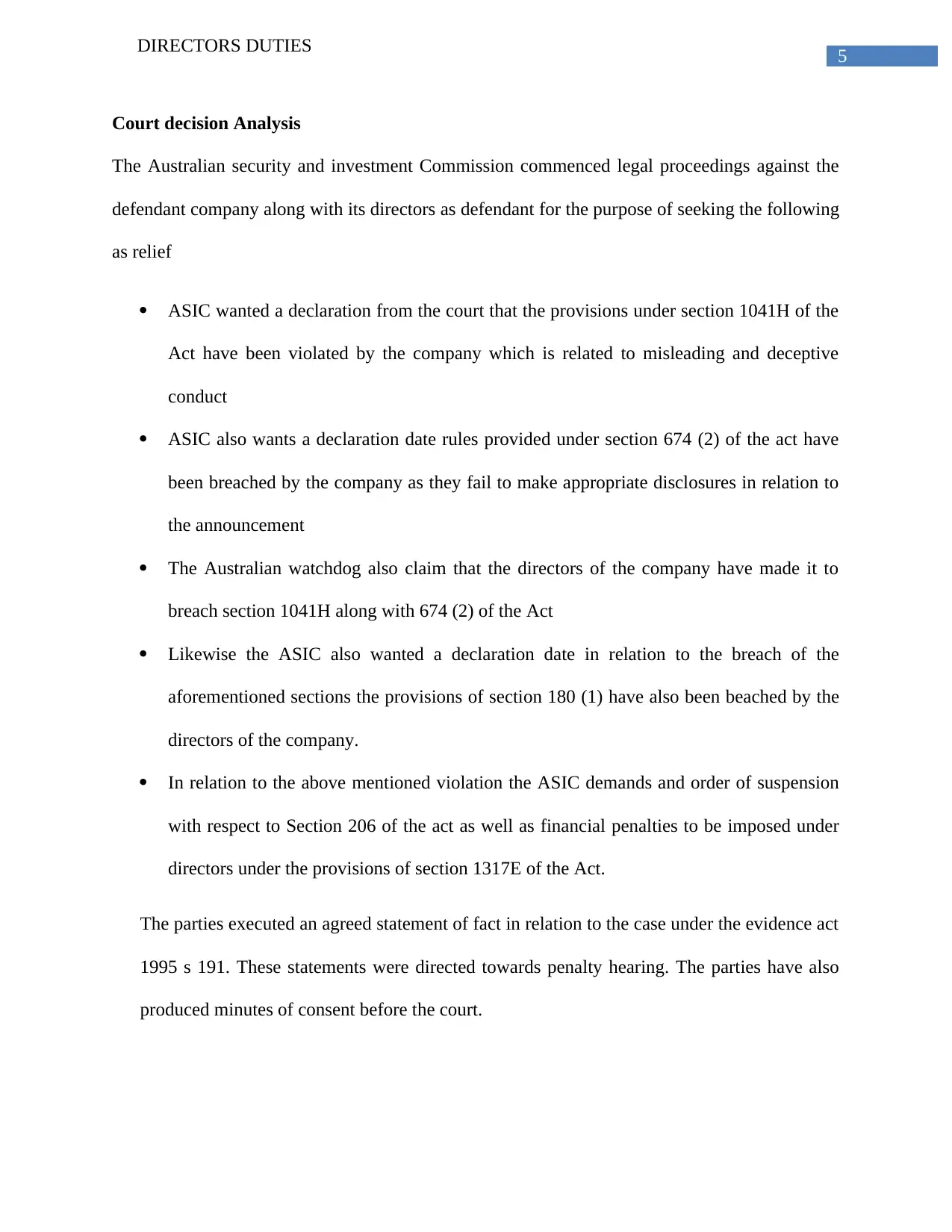
5
DIRECTORS DUTIES
Court decision Analysis
The Australian security and investment Commission commenced legal proceedings against the
defendant company along with its directors as defendant for the purpose of seeking the following
as relief
ASIC wanted a declaration from the court that the provisions under section 1041H of the
Act have been violated by the company which is related to misleading and deceptive
conduct
ASIC also wants a declaration date rules provided under section 674 (2) of the act have
been breached by the company as they fail to make appropriate disclosures in relation to
the announcement
The Australian watchdog also claim that the directors of the company have made it to
breach section 1041H along with 674 (2) of the Act
Likewise the ASIC also wanted a declaration date in relation to the breach of the
aforementioned sections the provisions of section 180 (1) have also been beached by the
directors of the company.
In relation to the above mentioned violation the ASIC demands and order of suspension
with respect to Section 206 of the act as well as financial penalties to be imposed under
directors under the provisions of section 1317E of the Act.
The parties executed an agreed statement of fact in relation to the case under the evidence act
1995 s 191. These statements were directed towards penalty hearing. The parties have also
produced minutes of consent before the court.
DIRECTORS DUTIES
Court decision Analysis
The Australian security and investment Commission commenced legal proceedings against the
defendant company along with its directors as defendant for the purpose of seeking the following
as relief
ASIC wanted a declaration from the court that the provisions under section 1041H of the
Act have been violated by the company which is related to misleading and deceptive
conduct
ASIC also wants a declaration date rules provided under section 674 (2) of the act have
been breached by the company as they fail to make appropriate disclosures in relation to
the announcement
The Australian watchdog also claim that the directors of the company have made it to
breach section 1041H along with 674 (2) of the Act
Likewise the ASIC also wanted a declaration date in relation to the breach of the
aforementioned sections the provisions of section 180 (1) have also been beached by the
directors of the company.
In relation to the above mentioned violation the ASIC demands and order of suspension
with respect to Section 206 of the act as well as financial penalties to be imposed under
directors under the provisions of section 1317E of the Act.
The parties executed an agreed statement of fact in relation to the case under the evidence act
1995 s 191. These statements were directed towards penalty hearing. The parties have also
produced minutes of consent before the court.
⊘ This is a preview!⊘
Do you want full access?
Subscribe today to unlock all pages.

Trusted by 1+ million students worldwide
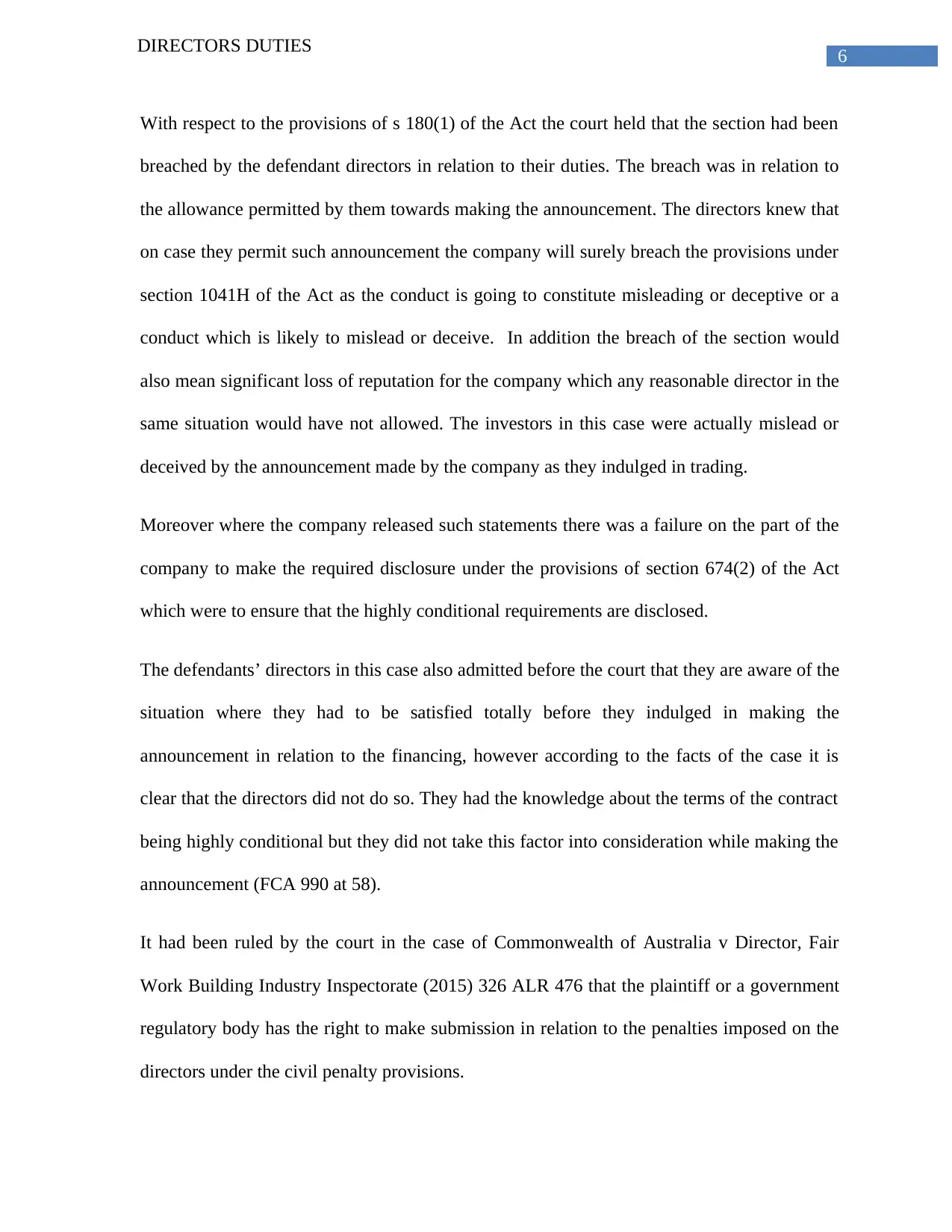
6
DIRECTORS DUTIES
With respect to the provisions of s 180(1) of the Act the court held that the section had been
breached by the defendant directors in relation to their duties. The breach was in relation to
the allowance permitted by them towards making the announcement. The directors knew that
on case they permit such announcement the company will surely breach the provisions under
section 1041H of the Act as the conduct is going to constitute misleading or deceptive or a
conduct which is likely to mislead or deceive. In addition the breach of the section would
also mean significant loss of reputation for the company which any reasonable director in the
same situation would have not allowed. The investors in this case were actually mislead or
deceived by the announcement made by the company as they indulged in trading.
Moreover where the company released such statements there was a failure on the part of the
company to make the required disclosure under the provisions of section 674(2) of the Act
which were to ensure that the highly conditional requirements are disclosed.
The defendants’ directors in this case also admitted before the court that they are aware of the
situation where they had to be satisfied totally before they indulged in making the
announcement in relation to the financing, however according to the facts of the case it is
clear that the directors did not do so. They had the knowledge about the terms of the contract
being highly conditional but they did not take this factor into consideration while making the
announcement (FCA 990 at 58).
It had been ruled by the court in the case of Commonwealth of Australia v Director, Fair
Work Building Industry Inspectorate (2015) 326 ALR 476 that the plaintiff or a government
regulatory body has the right to make submission in relation to the penalties imposed on the
directors under the civil penalty provisions.
DIRECTORS DUTIES
With respect to the provisions of s 180(1) of the Act the court held that the section had been
breached by the defendant directors in relation to their duties. The breach was in relation to
the allowance permitted by them towards making the announcement. The directors knew that
on case they permit such announcement the company will surely breach the provisions under
section 1041H of the Act as the conduct is going to constitute misleading or deceptive or a
conduct which is likely to mislead or deceive. In addition the breach of the section would
also mean significant loss of reputation for the company which any reasonable director in the
same situation would have not allowed. The investors in this case were actually mislead or
deceived by the announcement made by the company as they indulged in trading.
Moreover where the company released such statements there was a failure on the part of the
company to make the required disclosure under the provisions of section 674(2) of the Act
which were to ensure that the highly conditional requirements are disclosed.
The defendants’ directors in this case also admitted before the court that they are aware of the
situation where they had to be satisfied totally before they indulged in making the
announcement in relation to the financing, however according to the facts of the case it is
clear that the directors did not do so. They had the knowledge about the terms of the contract
being highly conditional but they did not take this factor into consideration while making the
announcement (FCA 990 at 58).
It had been ruled by the court in the case of Commonwealth of Australia v Director, Fair
Work Building Industry Inspectorate (2015) 326 ALR 476 that the plaintiff or a government
regulatory body has the right to make submission in relation to the penalties imposed on the
directors under the civil penalty provisions.
Paraphrase This Document
Need a fresh take? Get an instant paraphrase of this document with our AI Paraphraser
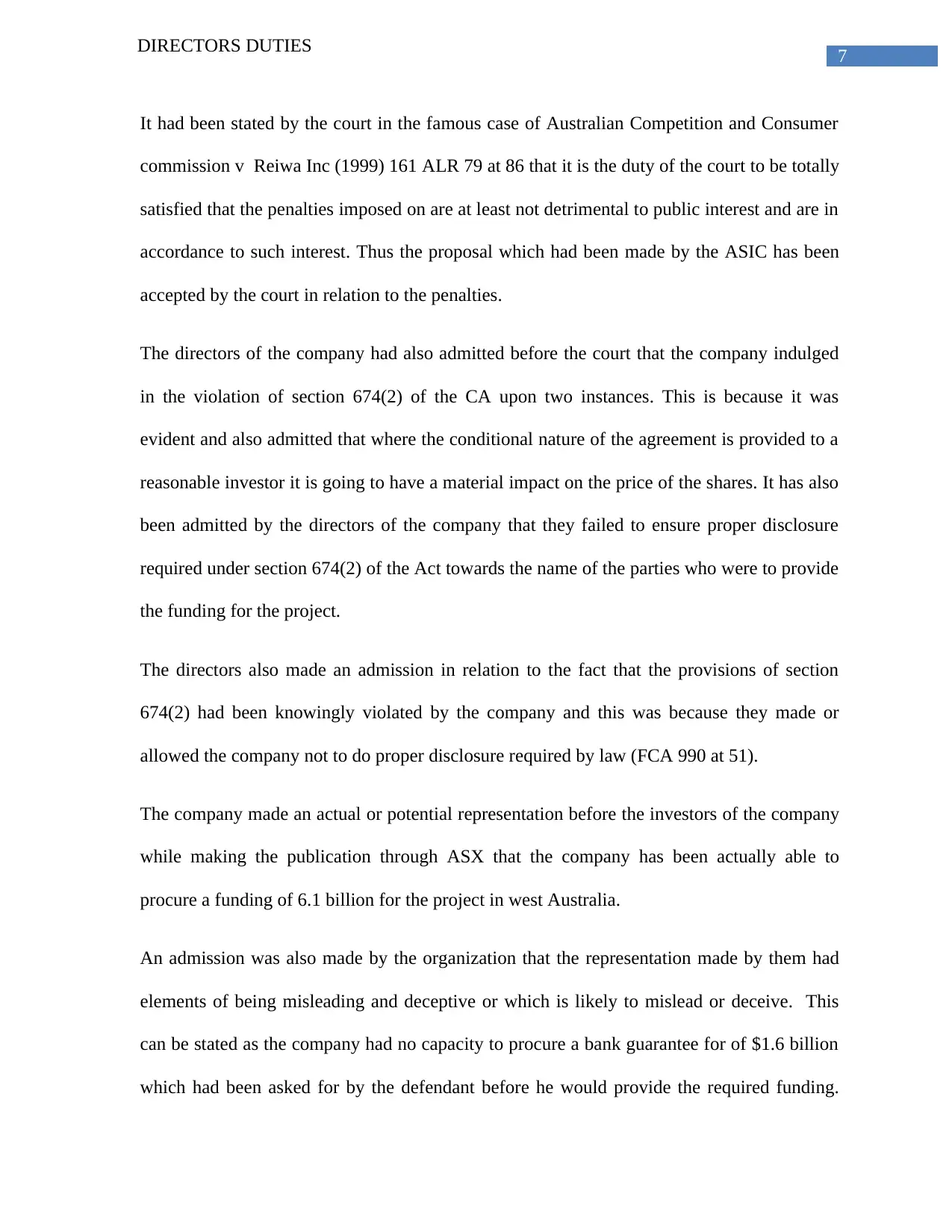
7
DIRECTORS DUTIES
It had been stated by the court in the famous case of Australian Competition and Consumer
commission v Reiwa Inc (1999) 161 ALR 79 at 86 that it is the duty of the court to be totally
satisfied that the penalties imposed on are at least not detrimental to public interest and are in
accordance to such interest. Thus the proposal which had been made by the ASIC has been
accepted by the court in relation to the penalties.
The directors of the company had also admitted before the court that the company indulged
in the violation of section 674(2) of the CA upon two instances. This is because it was
evident and also admitted that where the conditional nature of the agreement is provided to a
reasonable investor it is going to have a material impact on the price of the shares. It has also
been admitted by the directors of the company that they failed to ensure proper disclosure
required under section 674(2) of the Act towards the name of the parties who were to provide
the funding for the project.
The directors also made an admission in relation to the fact that the provisions of section
674(2) had been knowingly violated by the company and this was because they made or
allowed the company not to do proper disclosure required by law (FCA 990 at 51).
The company made an actual or potential representation before the investors of the company
while making the publication through ASX that the company has been actually able to
procure a funding of 6.1 billion for the project in west Australia.
An admission was also made by the organization that the representation made by them had
elements of being misleading and deceptive or which is likely to mislead or deceive. This
can be stated as the company had no capacity to procure a bank guarantee for of $1.6 billion
which had been asked for by the defendant before he would provide the required funding.
DIRECTORS DUTIES
It had been stated by the court in the famous case of Australian Competition and Consumer
commission v Reiwa Inc (1999) 161 ALR 79 at 86 that it is the duty of the court to be totally
satisfied that the penalties imposed on are at least not detrimental to public interest and are in
accordance to such interest. Thus the proposal which had been made by the ASIC has been
accepted by the court in relation to the penalties.
The directors of the company had also admitted before the court that the company indulged
in the violation of section 674(2) of the CA upon two instances. This is because it was
evident and also admitted that where the conditional nature of the agreement is provided to a
reasonable investor it is going to have a material impact on the price of the shares. It has also
been admitted by the directors of the company that they failed to ensure proper disclosure
required under section 674(2) of the Act towards the name of the parties who were to provide
the funding for the project.
The directors also made an admission in relation to the fact that the provisions of section
674(2) had been knowingly violated by the company and this was because they made or
allowed the company not to do proper disclosure required by law (FCA 990 at 51).
The company made an actual or potential representation before the investors of the company
while making the publication through ASX that the company has been actually able to
procure a funding of 6.1 billion for the project in west Australia.
An admission was also made by the organization that the representation made by them had
elements of being misleading and deceptive or which is likely to mislead or deceive. This
can be stated as the company had no capacity to procure a bank guarantee for of $1.6 billion
which had been asked for by the defendant before he would provide the required funding.
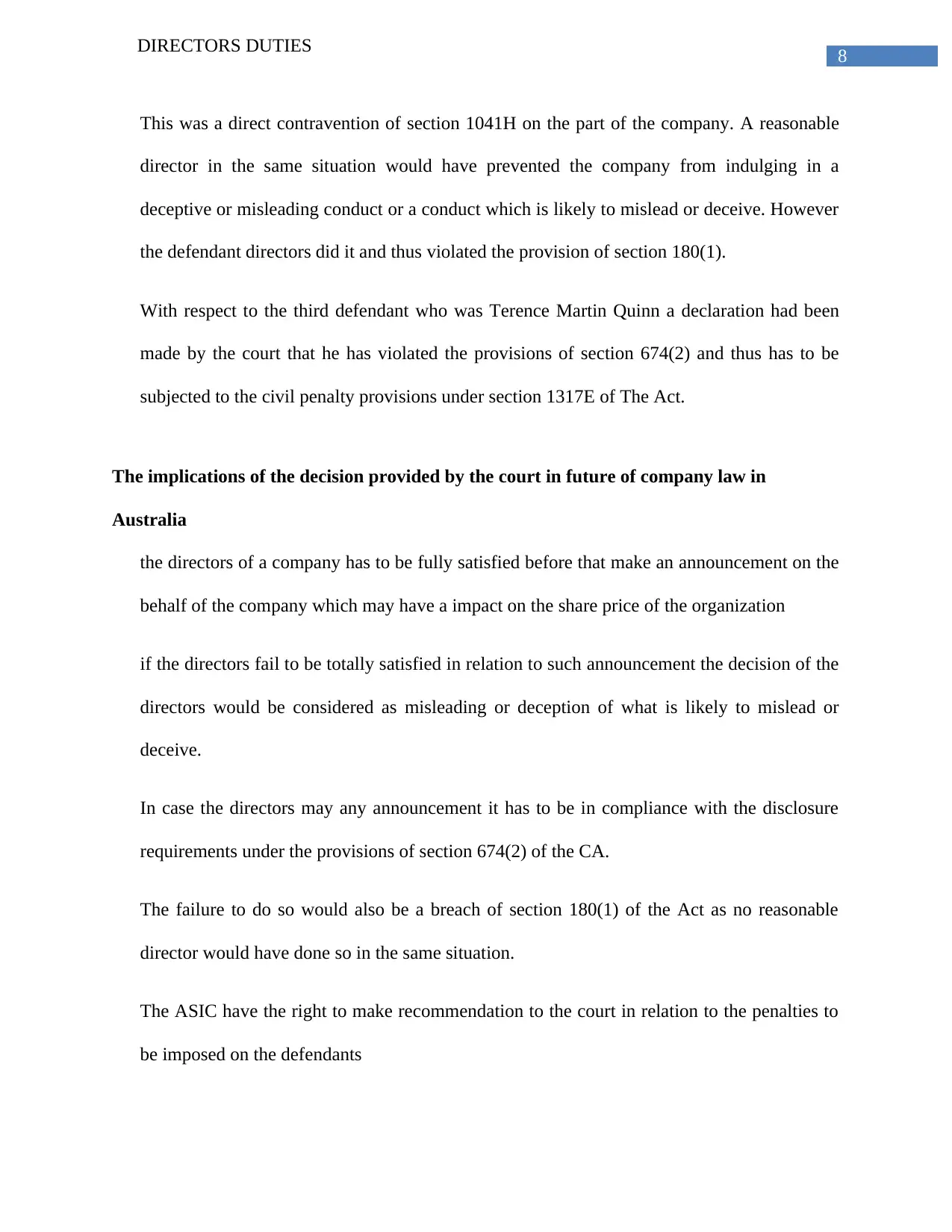
8
DIRECTORS DUTIES
This was a direct contravention of section 1041H on the part of the company. A reasonable
director in the same situation would have prevented the company from indulging in a
deceptive or misleading conduct or a conduct which is likely to mislead or deceive. However
the defendant directors did it and thus violated the provision of section 180(1).
With respect to the third defendant who was Terence Martin Quinn a declaration had been
made by the court that he has violated the provisions of section 674(2) and thus has to be
subjected to the civil penalty provisions under section 1317E of The Act.
The implications of the decision provided by the court in future of company law in
Australia
the directors of a company has to be fully satisfied before that make an announcement on the
behalf of the company which may have a impact on the share price of the organization
if the directors fail to be totally satisfied in relation to such announcement the decision of the
directors would be considered as misleading or deception of what is likely to mislead or
deceive.
In case the directors may any announcement it has to be in compliance with the disclosure
requirements under the provisions of section 674(2) of the CA.
The failure to do so would also be a breach of section 180(1) of the Act as no reasonable
director would have done so in the same situation.
The ASIC have the right to make recommendation to the court in relation to the penalties to
be imposed on the defendants
DIRECTORS DUTIES
This was a direct contravention of section 1041H on the part of the company. A reasonable
director in the same situation would have prevented the company from indulging in a
deceptive or misleading conduct or a conduct which is likely to mislead or deceive. However
the defendant directors did it and thus violated the provision of section 180(1).
With respect to the third defendant who was Terence Martin Quinn a declaration had been
made by the court that he has violated the provisions of section 674(2) and thus has to be
subjected to the civil penalty provisions under section 1317E of The Act.
The implications of the decision provided by the court in future of company law in
Australia
the directors of a company has to be fully satisfied before that make an announcement on the
behalf of the company which may have a impact on the share price of the organization
if the directors fail to be totally satisfied in relation to such announcement the decision of the
directors would be considered as misleading or deception of what is likely to mislead or
deceive.
In case the directors may any announcement it has to be in compliance with the disclosure
requirements under the provisions of section 674(2) of the CA.
The failure to do so would also be a breach of section 180(1) of the Act as no reasonable
director would have done so in the same situation.
The ASIC have the right to make recommendation to the court in relation to the penalties to
be imposed on the defendants
⊘ This is a preview!⊘
Do you want full access?
Subscribe today to unlock all pages.

Trusted by 1+ million students worldwide
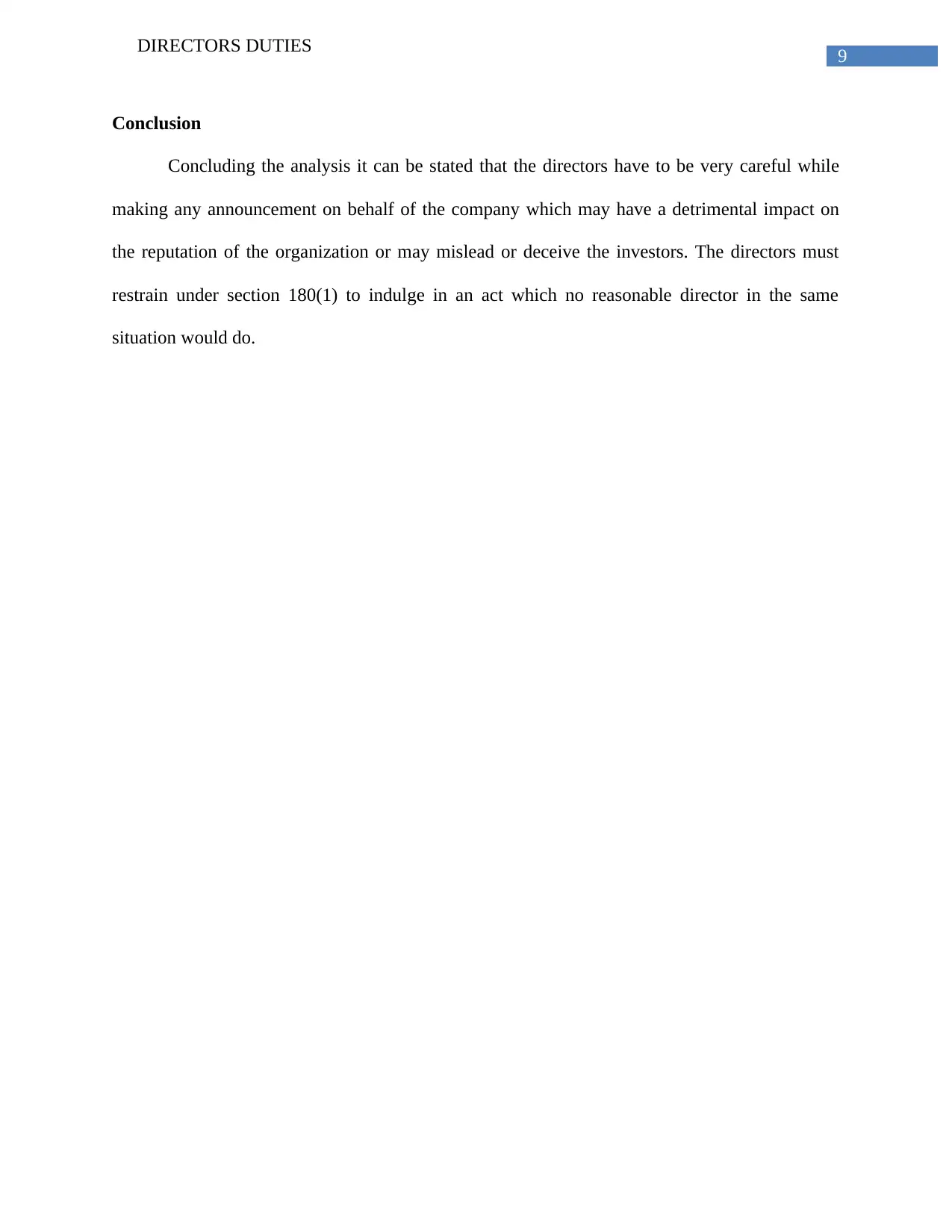
9
DIRECTORS DUTIES
Conclusion
Concluding the analysis it can be stated that the directors have to be very careful while
making any announcement on behalf of the company which may have a detrimental impact on
the reputation of the organization or may mislead or deceive the investors. The directors must
restrain under section 180(1) to indulge in an act which no reasonable director in the same
situation would do.
DIRECTORS DUTIES
Conclusion
Concluding the analysis it can be stated that the directors have to be very careful while
making any announcement on behalf of the company which may have a detrimental impact on
the reputation of the organization or may mislead or deceive the investors. The directors must
restrain under section 180(1) to indulge in an act which no reasonable director in the same
situation would do.
Paraphrase This Document
Need a fresh take? Get an instant paraphrase of this document with our AI Paraphraser
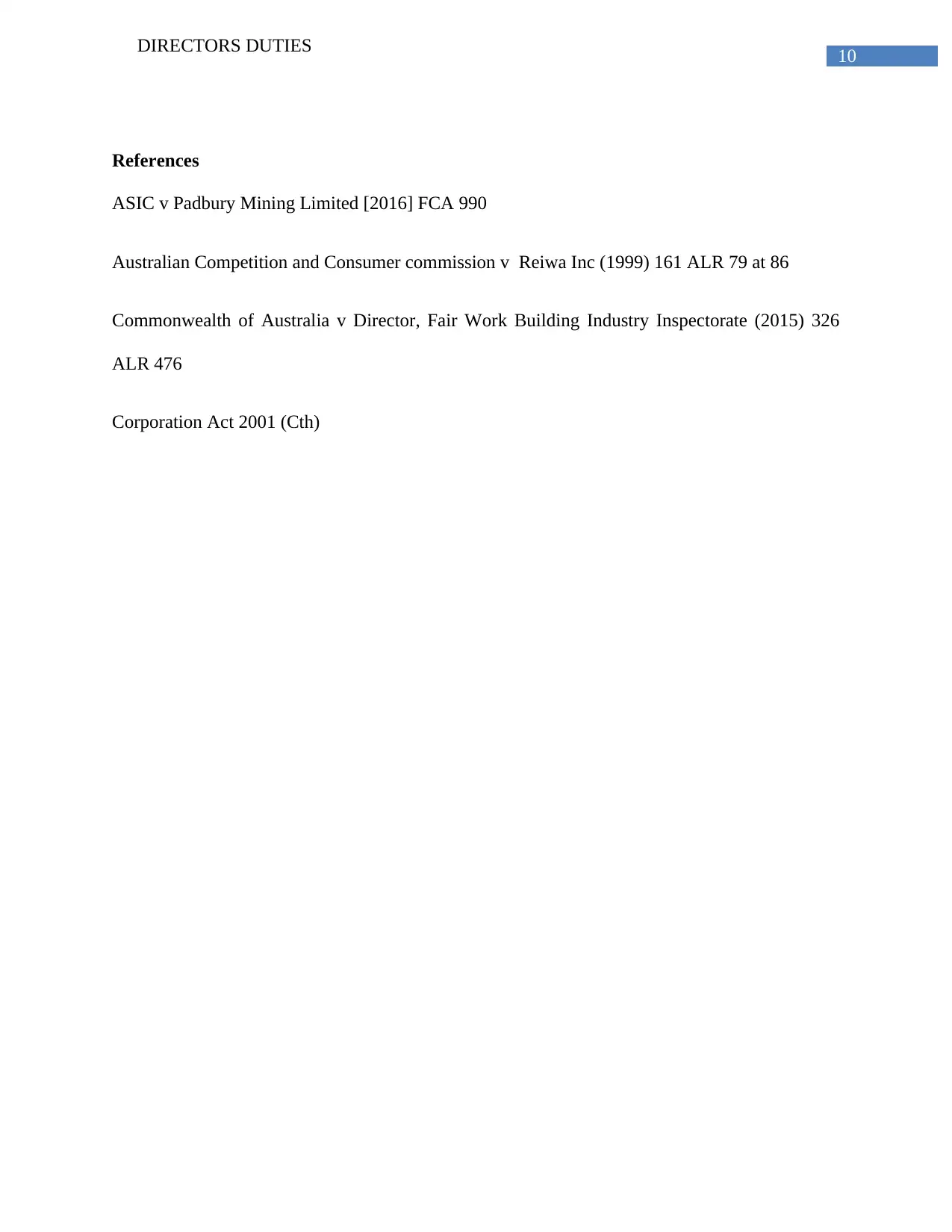
10
DIRECTORS DUTIES
References
ASIC v Padbury Mining Limited [2016] FCA 990
Australian Competition and Consumer commission v Reiwa Inc (1999) 161 ALR 79 at 86
Commonwealth of Australia v Director, Fair Work Building Industry Inspectorate (2015) 326
ALR 476
Corporation Act 2001 (Cth)
DIRECTORS DUTIES
References
ASIC v Padbury Mining Limited [2016] FCA 990
Australian Competition and Consumer commission v Reiwa Inc (1999) 161 ALR 79 at 86
Commonwealth of Australia v Director, Fair Work Building Industry Inspectorate (2015) 326
ALR 476
Corporation Act 2001 (Cth)
1 out of 11
Related Documents
Your All-in-One AI-Powered Toolkit for Academic Success.
+13062052269
info@desklib.com
Available 24*7 on WhatsApp / Email
![[object Object]](/_next/static/media/star-bottom.7253800d.svg)
Unlock your academic potential
Copyright © 2020–2025 A2Z Services. All Rights Reserved. Developed and managed by ZUCOL.
![Analysis of ASIC v Padbury Mining Limited [2016] FCA 990: Company Law](/_next/image/?url=https%3A%2F%2Fdesklib.com%2Fmedia%2Fimages%2Fne%2F983ce4e9e13344ea83ff41cee2ac9083.jpg&w=256&q=75)




